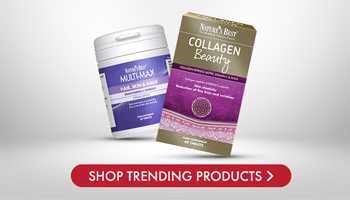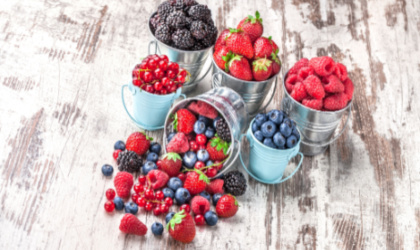
Aiming for 30-minutes of weight-bearing exercise daily is one of the best weapons in your arsenal for bone health. (Hint: your bones love walking, swimming, jogging and dancing).
Age-defying activity?
Dodgy knees, stiff backs, creaking shoulders – there are many reasons to throw in the proverbial exercise towel as you get older. But the principle ‘use it or lose it’ remains: ageing doesn’t lead to a decline in fitness; rather, a decline in fitness leads to ageing. Unfortunately, watching from the side lines isn’t an option if you want to look and feel great as you age.

Regular physical exercise can’t shave years off your chronological age, but it can certainly improve your health in a way that makes you look and feel younger than you are.
A sweat session gives you a greater sense of wellbeing, makes your skin glow, improves your posture and flexibility, supports sleep, enhances memory and slows cell ageing. Needless to say, exercise is a powerful anti-ageing tool.
Exercise should never be a chore; you should enjoy it! Find an activity that inspires you to move.
Exercise as a cognitive decline prevention
A study published in Neurology reported that women who were physically fit in middle age were around 88 per cent less likely to develop progressive neurological disorders than those in their cohort who were only moderately fit.1
Aerobic vs. resistance training
Cardio (aerobic exercise) – which gets sweat flowing and your heart pumping – and strength training – which helps preserve muscles from age-related decline – are two of the most valuable forms of exercise to focus on as you age. Aim for a few sessions of each per week: walking, hiking, and jogging are excellent examples of cardio, while tai chi, weight lifting and gardening, all count as useful strength training.
Green spaces are important
An analysis revealed that women living in areas of higher green vegetation experience lower rates of mortality.2 So, why not move your workout outside? Take a jaunt to your local park, meet friends for a bike ride, or find a quiet spot to practice yoga al fresco.
Spice things up in the bedroom
And who says physical activity can’t be hugely satisfying, too? Research conducted at the Royal Edinburgh Hospital reported that regular sex could make women look five to seven years younger.3 Thanks to the release of feel-good endorphins, sex can improve both your physical and emotional wellbeing.
Yoga for youthful looking skin
Some people call yoga a ‘natural face-lift’ – and they wouldn’t be wrong. Yoga is uniquely equipped to look after your body and mind as you age. Unlike traditional exercise, yoga combines movement that improves balance, circulation, strength, and flexibility with meditative techniques and conscious, controlled breathing.
Balance
Yoga improves your balance, which is one of the best ways to support your coordination and agility as you age. Harnessing this skill may help prevent falls and bone fractures, which can often accelerate the ageing process as you get older.
Improve flexibility
Aside from supporting balance, building flexibility is another important pillar of a yoga practice. Flexibility can be a helpful antidote to general muscle aches and pains that often characterise old age. Creating space and length in the body means bending down to pick something up or getting out of a chair won’t be met with the usual groans.
In yogic philosophy, a person’s age is determined by the flexibility of their spine. The body is as young as the spine is youthful.
Improve breathing
Conscious, controlled breathing is at the heart of any yoga practice. It’s a moving meditation, after all. Yogic breathing (pranayama) activates the parasympathetic nervous system, responsible for our ‘rest and digest’ state, which lowers stress in the body. And stress – as we will outline over the next few pages – speeds up the ageing process.
In one study, pranayama diminished perceived stress levels in healthy young adults. Researchers reported that controlled breathing down-regulates the nervous system, helping to reduce stress in the body.4
Body awareness
Yoga also increases body awareness to the subtle sensations arising inside you. And that’s no small feat: evidence suggests elevated body awareness may improve how well people take care of themselves throughout life.5
Stress and ageing
Chronic stress is endemic in our modern world. And although scientists are still getting to the bottom of how psychological stress leads to biological ageing, what they are certain of is that it speeds up the ageing process. But while we can’t necessarily remove the stressors from our lives (hello, taxing jobs, demanding families, jam-packed social calendars), we can draw on a number of tools to reduce their impact.
Why do we stress?
Let’s rewind millions of years ago, back when our stress response first evolved. Its primary function was to keep us safe so that if a wild animal started to chase us, our stress response would kick into gear. Our body would trigger a series of appropriate physiological and biological processes to keep us safe, such as releasing our stress hormone, cortisol, to help us think sharply and run away from danger.
Can stress cause skin problems?
A little bit of stress is very useful. Quite often, it turns us into the best versions of ourselves. (Ever noticed how you become superhuman when you’re slightly stressed?). The issue, however, is when stress becomes chronic. And that’s when a helpful response becomes harmful. Too much cortisol, for instance, can break down collagen and elastin in the skin’s connective tissues.
Manage your micro stress doses (MSDs)
Dr Rangan Chatergee believes we’re all exposed to a range of Micro Stress Doses (MSDs) every day. MSDs could be snoozing the alarm, seeing last night’s dishes in the sink, sifting through a full email inbox and hearing negative news. Although they’re tiny, they have a cumulative effect on your overall stress levels, draining your proverbial battery without you even realising it.
Here are some of the best ways to mitigate the MSD build-up: Move (even short-bursts of activity will help). Breathe deeply and mindfully. Seek positive social interaction. Enjoy a 20-second hug with someone you trust. Express yourself creatively. Sleep. Laugh. Cry.
Chronic stress can also contribute to an unhealthy lifestyle. People who are stressed are less likely to take care of themselves.
Most of us encounter several MSDs every day. Doing a couple of these quick releases every single day will help prevent any unresolved tension from accumulating.
Connect to your ‘why’
Humans need to feel purpose. It gives us a sense of direction and creates meaning. That’s why we all need to connect with our ‘why’. If you don’t know your ‘why’, then you’re probably not living life intentionally or as mindfully as you could be – and this is probably contributing to stress without you even knowing. Fortunately, there are many ways to cultivate a greater connection with yourself: mediation, journaling, conscious breathing, and mindful walking, to name a few.
Find your ikigai
Although there’s no direct translation to English, ‘ikigai’ is the Japanese concept of finding happiness in work and life – and it promises to be an antidote to modern-day stress. Ikigai is often associated with four overlapping qualities: doing something you love, you’re good at, the world needs and you can be paid for. Being mindful of this concept could help you lead a more fulfilling, stress-free life.
Morning pages
Consider starting your day with morning pages: write whatever’s on your mind – your worries, frustrations, or general banalities. Over time, this practice will start to unlock the corners of your unconscious mind and help you discover your ‘why’.
Allocate daily self-care
Mental fitness doesn’t mean smashing an IQ test; rather, it means keeping your emotional health in top-notch shape. It’s important to ring-fence time every day for your mental fitness. Mental First Aid England recommends committing to an hour of self-care daily to empty your stress bucket. If this seems unrealistic, start with 30-minutes. Within that window, try to do an activity that falls into one of the following categories: exercise, relaxation, or creativity.
Remember, looking after yourself isn’t selfish. Putting your needs first means you’ll be of better service to others. You need to put your oxygen mask on first, right?
Practice unconditional self-compassion
Chances are, you’ve spoken unkindly to yourself at some point; beaten yourself up; blamed yourself. We’re all guilty of it. But self-criticism puts the body and mind under stress. According to self-compassion expert, Dr Kristin Neff, individuals who practice more self-compassion tend to enjoy greater life satisfaction and less anxiety. When we’re kind to ourselves, we deactivate our stress system and activate our care system.
Instead of criticising yourself every time you look in the mirror, try high fiving yourself. Soon enough, this act of self-love will make you feel pretty damn good.
Cognitive decline is one of the most feared aspects of ageing. But maintaining good mental and cognitive health isn’t a game of chance. There’s still plenty you can do to keep your smarts sharp as you journey through life.
Eat to increase BDNF
It’s important to think beyond the brain molecules that are often mentioned in discussions about mental health, such as serotonin and dopamine. Above all of these players is BDNF (brain-derived neurotrophic factor), a neurohormone that supports neuroplasticity, brain resilience, brain repair, and brainpower. And we can eat in a way to increase BDNF. Upping your intake of dark chocolate, wild seafood and oily fish, berries and nuts will support the production of BDNF.
Get more sleep
Sleep isn’t a cost; it’s an investment for your lifespan and your healthspan. All the networks of the brain are augmented during sleep; memories are saved and shifted from short-term to long-term; the emotional networks of your brain are recalibrated and re-tuned. In short, sleep is the single most effective thing you can do to reset your brain every night.
Connect with others
Increasing evidence suggests having close friends and familial ties, as well as engaging in meaningful social activities, may help prevent cognitive decline later in life.6 The social psychologist, Jonathon David Haidt, coined ‘The Hive Hypothesis’, describing humans as 90% chimp, 10% bee.7 As an ‘ultra hive species’, he believes we need the connection of others to survive.
-
Join a class, club, or social group
-
Schedule in time to nurture relationships in your life
-
Use communication technology to keep you engaged
-
Befriend your neighbours and the people in your community
-
Smile and engage with strangers
-
Consider adopting a pet, volunteer for an animal charity or walk a neighbour’s dog
-
Volunteer
Move more
A new study reported that older adults with poor fitness levels experience more deterioration of white matter in the brain compared to their fitter counterparts.8 White matter deterioration is associated with a decline in the decision-making brain function among adults with early signs of memory loss.
The best nutritional supplements for ageing
Alongside changing your lifestyle to support your emotional and cognitive needs as you age, you may want to include more of the following brain food.
Magnesium
Magnesium contributes to normal psychological function, which may be a helpful addition. Eat it: Dark chocolate
Omega-3s
Found in oily fish, the long-chain omega 3 fatty acid, DHA (docosahexaenoic acid) contributes to the maintenance of normal brain function.* Eat it: Anchovies
B vitamins
The family of B vitamins are tremendously important for your health. And when it comes to looking after your brain, they really shine. Biotin, folate, niacin, thiamine, vitamin B12, and vitamin B6 all contribute to normal psychological function. Eat them: Leafy greens, dairy, and eggs
Siberian Ginseng
Siberian Ginseng helps to maintain that ‘get up and go’ feeling without the additional help of caffeine. Find it: Nutritional supplements
Ashwagandha
Ashwagandha is a revered herb of the Indian Ayurvedic system of medicine.
It’s often referred to as ‘Indian Ginseng’ since it possesses similar adaptogenic properties. Find it: Nutritional supplements
5 HTP
5 hydroxytryptophan, or 5 HTP, is the natural compound the body manufactures from the amino acid, tryptophan. The brain then converts 5 HTP into serotonin, our ‘feel-good’ neurotransmitter. Find it: Nutritional supplements
Rhodiola Rosea
Rhodiola Rosea has been used for centuries to support wellbeing. It’s the perfect partner to l-theanine, Siberian Ginseng, and magnesium. Find it: Nutritional supplements
St John’s Wort
A perennial plant with yellow, star-shaped flowers, St John’s Wort is a traditional herbal remedy used for the relief of mild anxiety and slightly low mood. Find it: Nutritional supplements
L-theanine
Most of us are familiar with that nice-cuppa-tea feeling. It just so happens the nation’s favourite brew contains the amino acid, l-theanine, which is believed to give it its oh-so-soothing properties. Find it: Nutritional supplements
Turmeric
Turmeric contains curcumin, which belongs to a family of compounds called Curcuminoids. To find out more about this fascinating herb jump online. Find it: Fresh turmeric, dried powder or nutritional supplements
Ginkgo Biloba
Ginkgo Biloba is a powerful bioflavonoid that has long been used in herbal medicine. It’s a popular choice for those looking to maintain normal cognitive function and blood system microcirculation. Find it: Nutritional supplements
Rosemary
Not just reserved for garnishing roasties; there’s some evidence to suggest rosemary may help maintain memory. Find it: Fresh herb or nutritional supplements
Sleep and ageing
There’s a lot of truth behind the idea of ‘beauty sleep’. Based on all the scientific evidence, sleep is the best (free) cosmetic treatment available. Of course, we’re not saying neglect your stash of eye creams and moisturisers. But getting enough sleep every night really is the secret to feeling – and looking – good as you age.
The benefits of sleep
Why does sleep make you glow, inside and out?
-
Sleep helps weight management
-
Sleep makes skin radiant and vital
-
Sleep increases the production of ‘youth’ hormones (human growth hormone is at its highest production during slow-wave sleep)
-
Sleep enables you to move quicker and learn faster
Enjoy a wind-down routine
Sleep is like landing a plane; it takes time to descend. Dim the lights. Make yourself a cup of herbal tea. Have a bath. Do some light stretching. Meditate. Read.
Digital detox before bed
Your late-night TV-watching, social media-scrolling, email-reading habits could be keeping you up at night. The blue light emitted from screens interferes with the body’s natural production of melatonin, your sleep hormone. Try disconnecting from all digital devices 60-90 minutes before bed.
Create an environment of absolute darkness
Your sleep sanctuary needs to be a place of rest: quiet, temperate, and, above all, dark. Darkness triggers the production of melatonin. If you’ve ever been camping, you probably slept well. Why? Because you were submerged in the natural cycle of daylight that dimmed into complete darkness – not a screen in sight, only the soft, golden glow of the fire.
Embrace darkness
-
Buy an old-fashioned alarm clock
-
Fit correctly sized, extra-thick curtains or blackout blinds
-
Remove all screens from your bedroom (phones, laptops, and televisions)
Get enough morning light
Alongside your traditional morning rituals, try to make time to salute the sun. Exposure to morning sunlight is an essential component of our evolutionary heritage. Not only does it make us feel good during the day, but it also calibrates our 24-hour internal clock (circadian rhythm) and readies the body for quality z’s at night.
The best supplements for sleep
Magnesium
Magnesium contributes to normal muscle and psychological function, making it a popular choice for sleep. Eat it: Kale
Valerian root extract
Valerian root is a traditional herbal remedy used for the temporary relief of night-time disturbances and mild anxiety. Find it: Nutritional supplements
L-theanine and lemon balm
L-theanine and lemon balm is a dreamy combination widely used for relaxation and sleep. Find it: Nutritional supplements
Sour cherry juice
Abundant in powerful antioxidants, sour cherry juice is gaining popularity in the sleep-wellness arena. Find it: Sour cherry concentrate
Lavender essential oil
Lavender essential oil has long been used for its soothing and restorative properties. Try diffusing this deliciously relaxing fragrance in your bedroom before sleeping.
Epsom salts
There’s nothing like unwinding in a hot bath before bed, especially with the addition of Epsom salts. Consider making it a mainstay of your evening, wind-down routine.
Caffeine is no friend of sleep. (It’s a stimulant, after all). Try to drink your caffeine in moderate amounts before midday to support your quest for rest.
Want to find out more?
Read more of our resources on ageing and related content here.
References:
-
Karam. C., Galletta S., Editors' note: Midlife cardiovascular fitness and dementia: A 44-year longitudinal population study in women. Neurology. 2018;91(16), 762.1-762
-
Time spent in “green” places linked with longer life in women - Harvard Health (2021). Available online: https://www.health.harvard.edu/blog/time-spent-green-places-linked-longer-life-women-2017030911152
-
(2021). Available online: https://www.ageuk.org.uk/latest-news/archive/sex-makes-you-five-years-younger/
-
Sharma V. et al., Effect of fast and slow pranayama on perceived stress and cardiovascular parameters in young health-care students. International journal of yoga. 2013;6(2), 104–110.
-
Daubenmier J. et al., The Relationship of Yoga, Body Awareness, and Body Responsiveness to Self-Objectification and Disordered Eating. Psychology Of Women Quarterly. 2005;29(2), 207-219.
-
Age UK (2021). Available online: https://www.ageuk.org.uk/information-advice health-wellbeing/mind-body/staying-sharp/looking-after-your-thinking-skills/social-connections-and-the-brain/
-
The Hive Hypothesis (2021). Available online: https://www.psychologytoday.com/gb/blog/hidden-motives/201210/the-hive-hypothesis
-
Ding K. et al., Cardiorespiratory Fitness and White Matter Neuronal Fiber Integrity in Mild Cognitive Impairment. 2018;729 – 739.
You Might Also Like

Olivia
Olivia Salter has always been an avid health nut. After graduating from the University of Bristol, she began working for a nutritional consultancy where she discovered her passion for all things wellness-related. There, she executed much of the company’s content marketing strategy and found her niche in health writing, publishing articles in Women’s Health, Mind Body Green, Thrive and Psychologies.
View More



